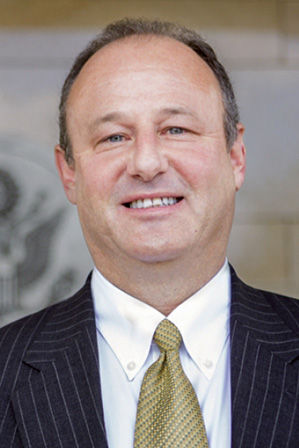A Fond but Cautionary Farewell
President’s Views
BY ERIC RUBIN

This is my last FSJ column as president of AFSA. In June, I reflected on the accomplishments of the past two AFSA boards and my hopes for future progress in the near term. Here, I’d like to share some thoughts about where we, the Foreign Service of the United States of America, find ourselves in 2023 and what needs to be done to restore morale and a sense of coherence and purpose to our work.
Before I do that, however, I want to pause to say that these past four years, and the 34 years of my career that came before them, have given me an understanding of the real dedication that our colleagues demonstrate every day, often under the most unforgiving conditions. The level of sacrifice our colleagues and their families make is deeply impressive. In recent years, the challenges to our career and our lives in the Foreign Service have escalated, from COVID-19 to the CDC dog ban, from Anomalous Health Incidents (or Havana syndrome) to the evacuation of our embassies in multiple countries.
So let me start out by saluting our active-duty and retired colleagues and all FS family members, as well as our dedicated Foreign Service National colleagues. You demonstrate the real meaning of service every day. The world is complicated and challenging, and the work that we do is more important than ever. But it is not easy. Despite the advances in transportation and communications, I honestly think the logistics of Foreign Service life were easier when I joined in the mid-1980s.
Morale Concerns
Concerns about morale are not theoretical. From the Office of Personnel Management’s Federal Employee Viewpoint Survey to the surveys that we, together with employee organizations, do ourselves, we know that morale is much worse than it was a decade ago and has not significantly improved in the past three years, even as we have made important progress on advancing DEIA matters within the Foreign Service.
Morale is directly linked to retention and attrition, and this includes family member morale as well. Too many families are making the collective decision that they cannot continue to endure the hardships, especially constant evacuations and drawdowns. Within the space of two years, we went from having more than 500 American family members in Kyiv and more than 300 in Moscow to nearly zero in both posts. The reasons are real and evident, but the impact has been dramatic.
Laws and regulations must be followed, of course. But the way they are implemented can make a dramatic difference. I am reminded of the phrase coined by “Pogo” cartoonist Walt Kelly, “We have met the enemy, and he is us,” adapted from a famous statement by Commandant Oliver Perry during the War of 1812. AFSA has been publicly critical of the excessive number of political appointments to senior positions, but in the case of morale, retention, and attrition, it is all too often our career colleagues, Foreign Service and Civil Service alike, who make it hard to stay in the Service.
Saying to a subordinate with a problem, “I know this is not a good situation, but I am going to do my best to change it if it is unfair or at least help you within the parameters of the regs” is way better than saying, “Sorry, there is nothing to be done, so suck it up.” All of us have encountered both responses from supervisors in our careers, but I am afraid the latter may be more common than the former.
Take Care of Each Other
This bureaucratic tendency has come into stark relief since the start of the pandemic. Travel regulations that never anticipated a global health crisis were not flexible enough to accommodate real people in real situations. Last summer, many FS travelers with pets were forced to pay their own transfer travel costs to and from post because we do not have an exception to the Fly America Act that covers pet travel. This is a reflection of the challenges our people face in 2023. It is wrong, and AFSA is working to get an exemption from Congress.
When I meet with new members of the Foreign Service from any of the foreign affairs agencies, I tell them that government service is sometimes like what Michael Corleone said in “The Godfather” (Part I): “It’s not personal. It’s strictly business.” I explain that it is very unlikely that career colleagues—or political appointee colleagues—will set out to ruin someone’s career or make the person miserable. But that can be the outcome, especially when you’re dealing with a vast, impersonal bureaucracy.
It has been the greatest honor to serve my country for 38 years together with the most impressive group of people I have ever encountered.
So my plea to colleagues as I retire from the Foreign Service is: Take care of each other. Be nice to each other. Be supportive whenever you can. Always err on the side of being more helpful and more supportive, within the limits of law and regulation. And be sympathetic and empathetic: This is a tough career, and we all need each other’s help to get through it.
We have spent the past 30 post–Cold War years cutting all the budgets for diplomacy and foreign assistance, with a few occasional plus-ups, and assuming that we did not have to get our game up to earn and maintain our leadership role in the world. But the end of the Cold War was not “the end of history,” and this set of realities is now being recognized as we open or reopen embassies in small island nations around the world.
Acknowledging New Realities
We still act as if the default setting is U.S. leadership, but without the need to staff it or fund it or earn it. History will not be kind to the way the U.S. and our allies have handled the past three decades. U.S. diplomacy and development have not been adequately funded or staffed during this time, and it shows. Ask anyone in any of our embassies and consulates overseas, especially but not exclusively those in Africa, and they will tell you that we are running on fumes.
After a small plus-up last year and the passage of the first State Authorization bill in many years, we are now back to hoping for no cuts and for holding the line on spending. That is not good enough.
Upping our game also means not assuming that we can send friends and donors overseas as ambassadors regardless of whether they have the qualifications to do the job well. I am not saying that there are no political appointee ambassadors who are superbly qualified and do a fantastic job. There are. But it is also not possible to say that they are all qualified.
We also must be able to expect appointees to complete their assignments. It costs hundreds of thousands of dollars to vet and confirm a presidential nominee. In the past two years, we have seen multiple political appointees resign their positions, in some cases only a few months after arriving at post. We have seen it with ambassadors to major U.S. allies and with assistant secretaries of State.
It rankles our career colleagues terribly when a political appointee says, “I did not realize how hard the job was and how hard it would be for my family.” We all know how hard it is. Give it to a career professional who will serve a full term rather than a political appointee who may leave in a matter of months.
Thank You
I would be remiss in not expressing my sincere thanks to the professional staff at AFSA. Their experience and wise counsel over the last four years have been crucial to the successes AFSA has achieved. I am grateful to all those who served on the Governing Board during both the 2019-2021 and the 2021-2023 terms: You kept me on my toes, fighting the good fight. And thank you to all those who volunteered their time as members of AFSA committees and the FSJ Editorial Board. Your dedication to the association keeps us going. Finally, thank you to outgoing State VP Tom Yazdgerdi, our incoming AFSA president. AFSA is in good hands.
This career has helped define my life, and it has been the greatest honor to serve my country for 38 years together with the most impressive group of people I have ever encountered. I treasure the friendships I have made in the Foreign Service, and those will last after I step away from active duty. I intend to remain engaged with Foreign Service reform issues—and of course with AFSA. There is strength in unity at a very challenging time.
Let me close by thanking all of you who have been such valued friends and colleagues, and once again saluting you and your families for your service, sacrifice, and dedication. What we do matters, and fixing what is broken in our Service matters, as well. Diplomacy and international development work are the primary alternatives to war and destruction and suffering. We can and should be proud of our work.
Let’s recommit to fixing what ails the U.S. Foreign Service and continue to work for a better world at a time of intense change and upheaval. And let’s take care of each other.
When sharing or linking to FSJ articles online, which we welcome and encourage, please be sure to cite the magazine (The Foreign Service Journal) and the month and year of publication. Please check the permissions page for further details.


